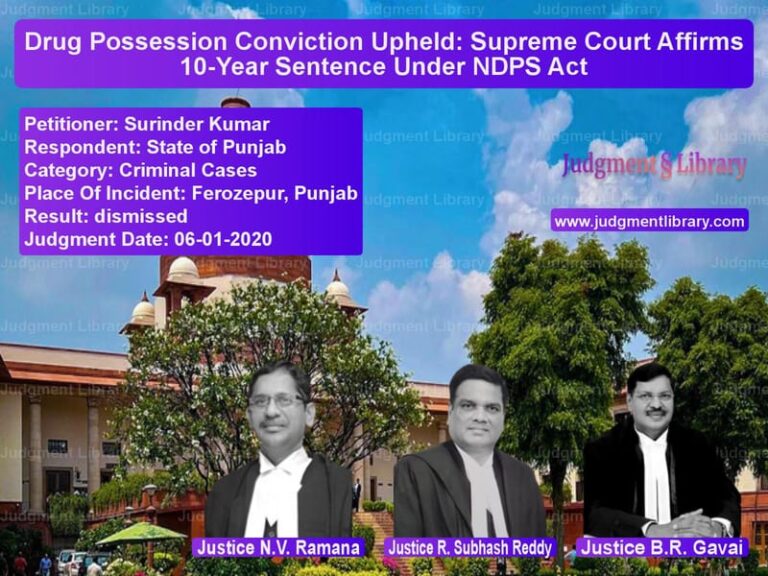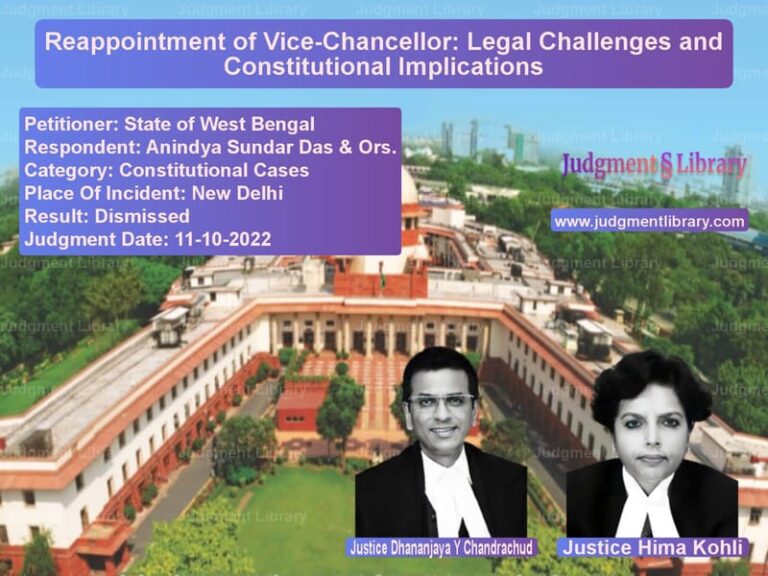Supreme Court Upholds Haryana’s Land Use Notification in Shalimar Estates Case
The case of State of Haryana & Ors. v. Shalimar Estates Pvt. Ltd. & Ors. revolved around the legality of two notifications issued under the Punjab Scheduled Roads and Controlled Areas Restriction of Unregulated Development Act, 1963, and the Haryana Development and Regulation of Urban Areas Act, 1975. The Supreme Court set aside the Punjab and Haryana High Court’s judgment, ruling in favor of the Haryana government, and upheld the state’s power to regulate land use in controlled areas.
The Court ruled that private developers cannot claim immunity from regulatory restrictions simply because they had initiated development activities before the formal declaration of an area as a controlled zone. This judgment emphasizes the importance of urban planning and the government’s role in ensuring sustainable land use.
Background of the Case
The dispute arose when Shalimar Estates Pvt. Ltd. challenged two notifications issued by the Haryana government:
- A notification dated July 11, 2002, under the Punjab Scheduled Roads and Controlled Areas Restriction of Unregulated Development Act, 1963 (Controlled Areas Act), declaring certain lands in Panchkula as controlled areas.
- A notification dated December 31, 2002, under the Haryana Development and Regulation of Urban Areas Act, 1975 (Urban Development Act), regulating land use in the specified areas.
Shalimar Estates argued that they had already initiated a residential project in the area before these notifications were issued, including purchasing land, advertising for buyers, and starting physical infrastructure work. They alleged that the state’s actions were arbitrary and aimed at disrupting their project.
Read also: https://judgmentlibrary.com/supreme-court-dismisses-review-petition-in-bihar-property-dispute-case/
Arguments by the Petitioner
The Haryana government, represented by Senior Counsel Gurinder Singh Gill, argued:
- The notifications were issued in accordance with statutory powers to regulate land use and prevent haphazard urban development.
- The developers had no vested right to continue their project without government approval.
- The state had the authority to impose restrictions under the Controlled Areas Act and the Urban Development Act to protect public interest and ensure planned development.
Arguments by the Respondent
Shalimar Estates Pvt. Ltd., represented by Counsel Abhinav Agnihotri, countered:
- Their project was already in progress, with land purchased and plots sold to over 500 buyers.
- The government’s sudden notifications disrupted their legally conducted business and caused financial loss.
- The speed with which the notifications were issued suggested malafide intent by the state authorities.
Supreme Court’s Judgment
The Supreme Court, comprising Justices V. Ramasubramanian and Hemant Gupta, ruled in favor of the State of Haryana, stating:
“All that is required for the Government to issue a notification under Section 4(1) of the Controlled Areas Act is to show either that the area to be notified is located within a distance of 8 km from a town boundary or 2 km from the boundary of an industrial or housing estate. It was not the case of the respondent that none of these requirements was satisfied.”
The Court found that:
- The notifications were lawfully issued and did not violate any rights of the developers.
- The developers should have sought approval under the relevant laws instead of challenging the notifications.
- While the developers had sold plots, they had not obtained the necessary permissions, making their claims legally untenable.
Regarding claims of malafide intent, the Court stated:
“Despite commenting upon the speed with which the file for the issue of the notification was moved, the High Court did not record a clear finding of malafides. A half-hearted attempt is not sufficient to hold a statutory notification as vitiated.”
Conclusion
The Supreme Court’s ruling reaffirms the state’s authority to regulate land use and restrict unapproved development. It underscores the importance of obtaining proper approvals before undertaking real estate projects. The judgment sets a precedent for urban planning policies across India, ensuring that private developers adhere to regulations before initiating large-scale residential or commercial projects.
Petitioner Name: State of Haryana & Ors..Respondent Name: Shalimar Estates Pvt. Ltd. & Ors..Judgment By: Justice V. Ramasubramanian, Justice Hemant Gupta.Place Of Incident: Panchkula, Haryana.Judgment Date: 16-11-2021.
Don’t miss out on the full details! Download the complete judgment in PDF format below and gain valuable insights instantly!
Download Judgment: state-of-haryana-&-o-vs-shalimar-estates-pvt-supreme-court-of-india-judgment-dated-16-11-2021.pdf
Directly Download Judgment: Directly download this Judgment
See all petitions in Property Disputes
See all petitions in Landlord-Tenant Disputes
See all petitions in Specific Performance
See all petitions in Judgment by V. Ramasubramanian
See all petitions in Judgment by Hemant Gupta
See all petitions in allowed
See all petitions in supreme court of India judgments November 2021
See all petitions in 2021 judgments
See all posts in Civil Cases Category
See all allowed petitions in Civil Cases Category
See all Dismissed petitions in Civil Cases Category
See all partially allowed petitions in Civil Cases Category







